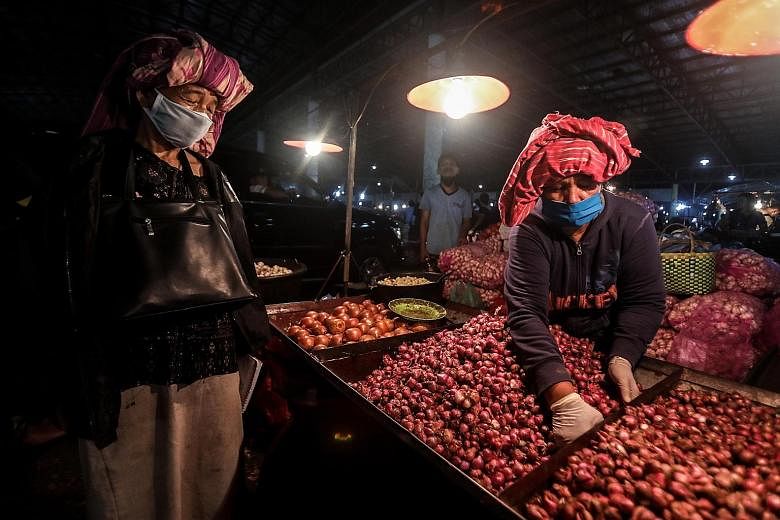Strengthen international cooperation
Editorial
The Yomiuri Shimbun, Japan
An increasing number of countries are placing priority on securing food for their own nation and restricting exports. They are concerned about the stagnation of production amid the pandemic. If such moves expand, the world's food supply system could be shaken.
According to the Agriculture, Forestry and Fisheries Ministry, exports are being restricted in at least 13 countries. World Trade Organisation rules prohibit the control of exports unless there is a critical shortage of food supplies within that country.
In a statement issued after an emergency video conference, the agriculture ministers of the Group of 20 (G-20) major economies called for restraints on export restrictions, saying such moves "could lead to excessive food price volatility in international markets and threaten the food security".
It is significant that major countries and regions shared the recognition of the importance of a stable food supply. What is important is to protect developing countries that suffer from severe shortages. The situation could worsen if agricultural production faces declines due to the spread of the infections, coupled with export restrictions in food-producing countries. The G-20 economies and other countries need to make every effort to help developing countries through ways like food aid and promoting the agriculture industry.
Japan depends on imports for wheat and other grains but has seen little impact so far as countries like the United States, Australia and Brazil continue to export to Japan. It has a stockpile of agricultural products and is self-sufficient in rice.
The government must cooperate with private enterprises to ensure stable food supply. Japan should persistently emphasise that free trade is indispensable for stable growth in the global economy.
Indonesia needs local solutions
Mulia Nurhasan, M. Hariyadi Setiawan, Miranda
The Jakarta Post, Indonesia
The Covid-19 pandemic has created disruption in our food systems. The decades of effort to homogenise Indonesian food systems have made our food security vulnerable to supply shocks. The global pandemic needs local solutions that take full account of the potential diversity of Indonesia's food systems.
Policymakers must put cluster-based value chains into practice, support initiatives promoting food systems resilience, harmonise food-system issues from agriculture to health, while promoting more diversified diets to the public.
Since Indonesia's first confirmed case of Covid-19, there have been episodes of panic-buying and panic-selling. Such panic potentially contributes to additional food waste.
The large-scale social restrictions have naturally forced businesses to more geographically-clustered distribution channels.
To some, the pandemic stimulates more digital platforms that allow transactions with less contact among those involved. But many stakeholders in our food systems, especially small-scale food producers, are not prepared for such transformations.
With over 17,000 islands and a population exceeding a quarter of a billion people, Indonesia's food system comprises multiple overlapping and distinct systems.
In the past, diets in one region could be very different from another, depending on the different local natural resources and food cultures. But for decades, agriculture policy and the food industry have been focusing on only a few types of plants and animal species.
Consequently, most farming resources are used only for these commodities. This type of intensive monoculture-based food production may have produced more staple crops, but it has also destroyed biodiversity.
This leads us to dietary transitions away from local foods, towards homogenous foods.
The pandemic has made us aware of the fragility of our food system, with national dependence on a single staple, and heavily imported food items.
So what strategy should we prioritise? National policies to assure food security in Indonesia should not be homogenised across regions. Instead, we should consider local natural resources, agricultural suitability and cultures.
Prevent virus-induced hunger
Marco Sanchez Cantillo
China Daily, China
Many uncertainties haunt the world's campaign to counter the Covid-19 pandemic, but one thing is now sure: Global economic activity will suffer greatly, with large-scale consequences for the incomes and welfare of all, but especially for the most vulnerable food import-dependent countries.
Analysing data of food supply since 1995, we find that millions of people are likely to join the ranks of the hungry as a result of the Covid-19 triggered recession.
That number will vary according to the severity of gross domestic product growth contractions, ranging from 14.4 million to 80.3 million, depending on the scenario. The actual outcome could be worse if current inequalities in access to food worsen something that absolutely should not be allowed to happen.
Health is the first priority, but sufficient and healthy food is a central part of the health response to the pandemic. Inadequate action will also severely weaken vulnerable populations for years to come. This would make the prospect of achieving the sustainable development goals all the more difficult.
So not only must efforts focus on keeping food supply chains alive, but it is also imperative to focus on food accessibility for all.
Governments have an opportunity to tackle this issue head on by targeting the required official stimulus packages to the poorest and undernourished.
Tools such as cash and in-kind transfers, new credit lines, safety nets, food banks and keeping school-lunch programmes alive can be useful.
• The View From Asia is a compilation of articles from The Straits Times' media partner Asia News Network, a grouping of 24 news media titles.

